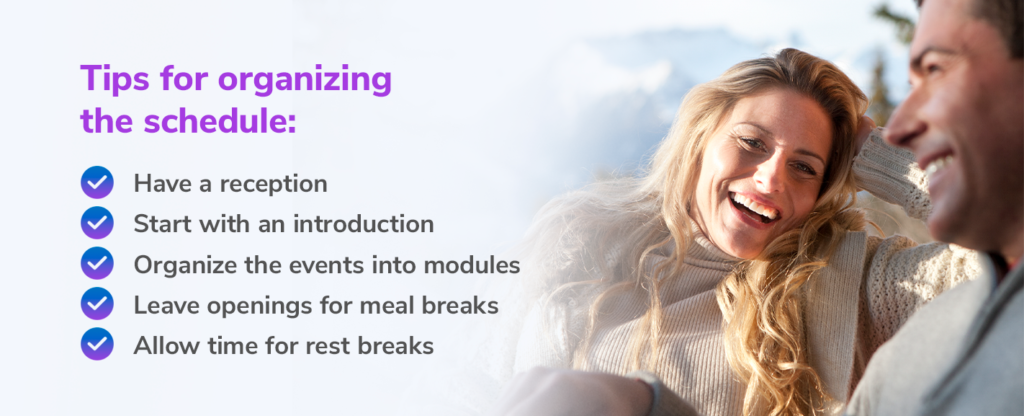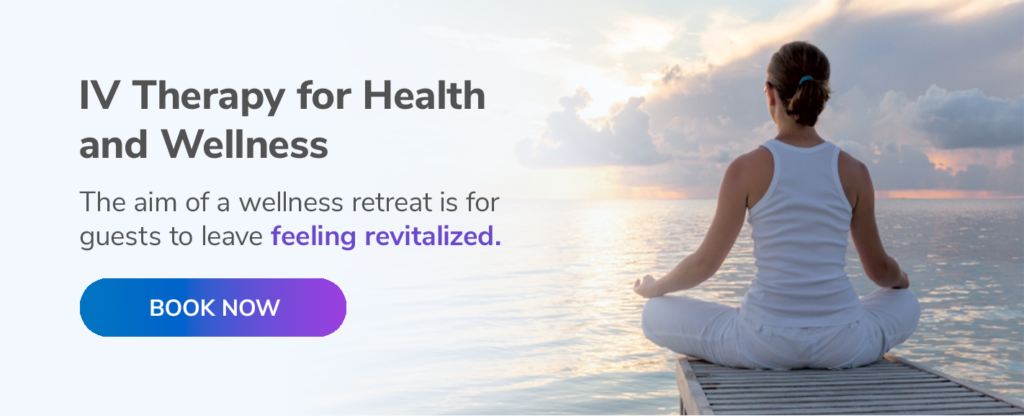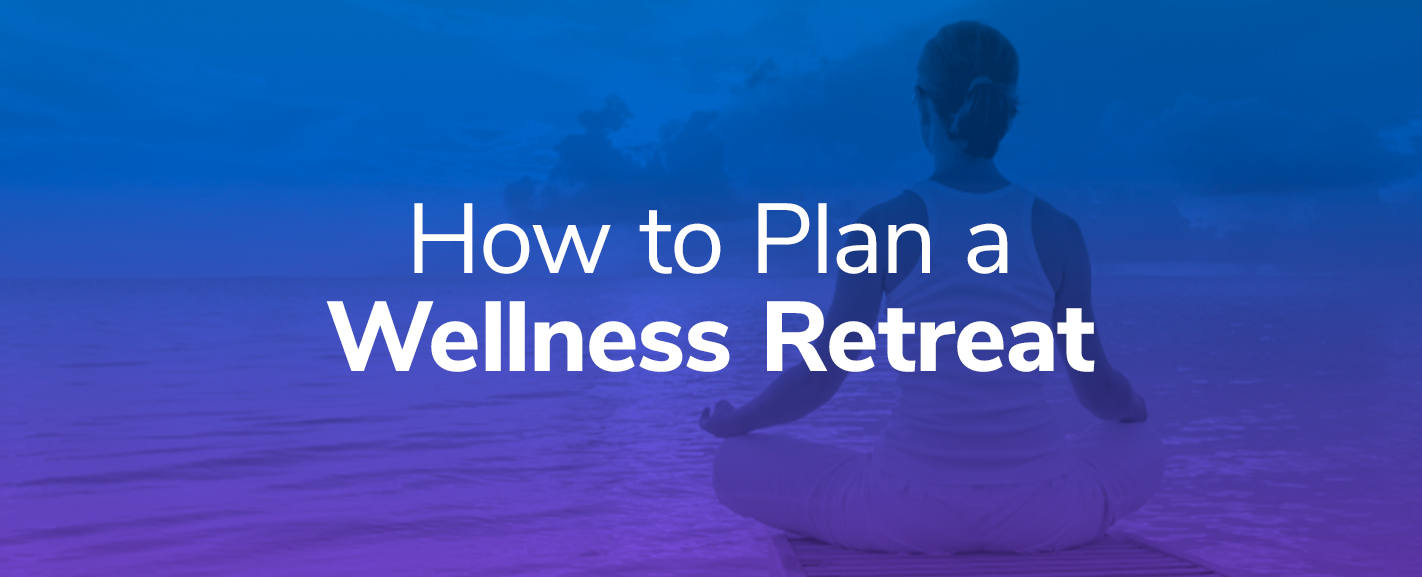A wellness retreat offers an escape from your daily life and lets you connect with others while developing in meaningful ways. With many connections coming from the internet and developing through social media, hosting a wellness retreat gives you the opportunity to get to know like-minded people in a relaxing atmosphere.
Jump Ahead:
Ready to get involved in the wellness community? Activities can range from spa treatments to guided meditations. Learn how to plan your own wellness retreat below.

Hosting a Wellness Retreat
Before you get started, carefully plan your arrangements for the venue and other retreat features. Even if your plan changes later or fewer guests attend than expected, a plan helps keep you organized. Here are some tips for making the arrangements:
Choose a Theme
Your wellness retreat can involve anything from a detox cleanse to a survival camp. The retreat can be for a specific group of working professionals, such as business owners. You can also base the retreat on a hobby for amateurs, like jewelry collecting or makeup artistry. Time your retreat around a holiday and host a festive theme, decorating for the occasion.
The possibilities are up to your unique sense of creativity. Some tips for selecting a worthwhile topic or theme:
- Consider the costs: Depending on the kind of experience you wish to provide, expenses could be more than expected. Make sure to draw up a list of expenses based on your theme.
- Plan for a convenient time frame: Set the retreat for a weekend well in advance, so guests have time to prepare. Some guests might want to leave early, so it’s a good idea to hold the most important events early.
- Incorporate your personal knowledge: Some retreats host guest speakers, but if you’re running everything yourself, it’s easier to host a topic that you have insider knowledge of. It’s helpful to be a fan of your theme, but you can discuss the topic at length much more easily if you are a regular participant in the specific hobby or profession.
Plan the Guest List
You probably want to invite your closest friends, but who else could fit on your list? Ask yourself these questions:
- Who might be interested in a wellness retreat?
- Could my guests afford this, and would they want to spend money on it?
- If I make it a free event, are the venue, food and staff costs too high?
- What can I do for my guests to make sure they have an enjoyable experience?
- Do you need to provide transportation for guests? Is the parking lot large enough to accommodate them if they want to drive?
The answers to these questions could all factor into how many people can attend. After making an estimation, you should have a good idea of how many people to buy for, but it’s also a good idea to ask your guest to RSVP. You want to be prepared to serve the number of people attending.
Select the Venue
Once you have an idea of how many people might attend, decide on a venue capable of hosting your retreat with full attendance. Your home is probably too small, but there are other reasons to rent a space away from home. This is also when you need to start considering factors like how the guests will arrive there.
Below are some possible spaces to rent:
- Smaller-budget venues: An Airbnb, lake house, camping cabin or hotel suite are all good choices for a small retreat with few guests. These would all work for a small group of close friends, for example.
- Larger-budget venues: An event center or conference hall would have enough space to include a larger number of guests. One of these larger venues would generally be a more expensive option. If you’re planning a retreat on a larger scale, consider charging each guest an entrance fee for attending. As a reported $4.5 trillion global market, wellness is an industry many are willing to pay money for.
Set the Date
What weekend would work the best for everyone? To maximize attendance:
- Take a poll: This is the easiest way to ask guests directly which weekend they are free.
- Give yourself time: As the organizer, it’s important to make sure you have plenty of time to prepare all arrangements. If it’s your first retreat, set the date for at least a month into the near future. An interested party might tell you an earlier date would work best for them, but you should host your retreat on a day when you know you’re going to feel comfortable with how everything turned out.
- Avoid holiday weekends: Retreats with a seasonal theme can be a lot of fun, but chances are, everyone has something else going on around the holidays. Schedule a festive retreat for the weekend before an important holiday or earlier in the month to keep conflicts to a minimum.
Keep expectations realistic when hosting a weekend event. It might be impossible for all of your closest friends to be there, but you can make the retreat convenient for the majority of the people on your guest list.
Make an Itinerary
Leaving the schedule a mystery can inevitably lead to guests speculating about what you will be doing. When they get to the retreat, it might turn out differently than they expected. A schedule of events is the most professional way to host a retreat. Ensure all guests have access to the itinerary.
Ideally, you should also allow guests to choose which events they want to skip. Below are more tips for organizing the schedule:
- Have a reception: This is a set meeting where everyone gets snacks or refreshments while waiting for the retreat to officially begin. You can greet each guest at the reception and chat with them briefly as more guests arrive.
- Start with an introduction: Like the syllabus day of a course, your first meeting should introduce your guests to the venue and staff. This ensures guests know what to do while waiting for the events to start. You can be undetailed if you like, but you can use this as an opportunity to draw attendance to your first planned event if you reference it during the initial meeting.
- Organize the events into modules: Neatly coordinating everything helps you stay on track. You might end up with additional time when a speaker takes less to present, or you might fall a little behind, depending on the circumstances. A written schedule ensures you remember to include everything.
- Leave openings for meal breaks: If your retreat starts in the morning, having a buffet-style breakfast and lunch rather than sit-down meals could provide the most comfort to your guests.
- Allow time for rest breaks: Avoid planning events to run back-to-back. Give guests at least 10 minutes to take a break between events. Rest breaks help keep attendance up throughout the day, and it also gives your presenters time to recharge.

Promote Your Retreat
If you would prefer to get a large crowd, use promotional tools to draw in interest. Outlets you can use include:
- LinkedIn, Facebook and other social media apps: Make a public event and post it where locals can see it. Another bonus to using social media — if you set up a livestream, people can participate in the retreat without actually attending, and they might come to your next one.
- A subscriber management software like Mailchimp: Send out a mass invite to your event to generate buzz, and send reminders close to the time of the event to remind your guests of the itinerary.
- A video advertisement: Showcase your personality in a short video describing the highlights of your plans or the venue. Share the video to draw more interest.
Activity Ideas
After choosing a theme, coming up with the activities is easy until you start to run out of ideas. Wellness is a broad category, and you can make creative adjustments to each activity to make sure it fits most themes. For example, if you’re having a holiday party, you can simply express the festive occasion through the decor. Here are some general wellness retreat activities and other events that can go with just about any theme:
Host Guest Speakers
Partnering with guest speakers allows you to spread out the responsibility and let someone else direct important parts of the retreat. Speakers should also make your retreat a higher quality experience by teaching your guests how to practice mindfulness and care for their bodies.
Tips for finding qualified guest speakers:
- Contact professionals who you know personally and ask if they would offer help with a retreat. Maybe you’ve worked with someone in the wellness industry or used their services yourself? This way, you already have expectations that whoever you hire does a good job.
- Reach out to a college and ask if any students would be interested in helping. In exchange for volunteer work, students receive the opportunity to practice communication related to their studies and a quality reference on their resumes.
- Before you book a professional, check to see if they have a website and a legitimate business. Look at their ratings and reviews. Read some of their content, and determine if you agree with their methods.
Hold Workshops
If your theme is more about professional development, workshop time slots are a great way to set up engaging presentations. Below are some tips for hosting interesting workshops:
- Let the professional presenters choose their time slot from a list. This way, you know they have availability, and they can prioritize a presentation in their schedules for the day.
- Ask speakers to present on a specific topic, and approve their topics yourself for the event. You want to make sure your speakers stay on topic. For example, they should present on professional development if that is your theme instead of something random like how to prepare a healthy salad.
Set Up a Day Spa
Spa treatments pair well with wellness in general, and you can easily work them in on a budget. Below are some tips for including spa treatments at your retreat along with the educational workshops:
- Book a massage therapist: Massages soothe away stress. Ask if they bring their own portable table and lotion. You might have to provide clean sheets and towels, or you can ask guests to bring towels from home.
- Research home spa treatments and techniques: You can host a day spa without being an expert, but it helps to have some background knowledge.
- Order the supplies: You can find many natural supplies for a spa session at your local supermarket. Stock up on avocado, honey, coffee and other edible products that are also great for the skin. If you have a large guest list, it’s best to wait about a week to see how many people RSVP before ordering premium spa packages.
Arrange a Yoga Class
Yoga is a common wellness activity that helps keep your muscles in shape while limiting cardiovascular strain. Tips for hosting a yoga class:
- Hire a yoga teacher so you can participate in the fun.
- Choose an ideal space for the class. A flat, uncarpeted floor makes the most comfortable space for a yoga class.
- Keep some extra yoga mats available. Some of your guests might forget to bring their own.
- Make sure you have a large enough space for everyone to spread out properly.
- Have bottled waters ready. Yoga can be strenuous, and it’s important for everyone to stay hydrated.
Ask Your Guests to Prepare for the Occasion
For an enjoyable retreat, communicate with your guests in preparation for what’s to come. You can hold back a few surprises, but setting up expectations for the weekend is preferable. Below are tips for keeping them informed:
- Suggest a dress code: Gym clothes are perfect if you’re going to be doing yoga, and pajamas are great for a cozy atmosphere. Make sure your guests know to wear casual attire, or they might arrive in their favorite jeans or club dresses.
- Remind them of what they will need: Maybe your guests will only need to bring money for an entrance fee? Maybe they will have to bring a few supplies to participate in some of the events? A guest could forget something, so you can always stock extra supplies for them to borrow if necessary.
- Ask about food preferences: Many of your guests could have a food allergy or be on a special diet. If you are serving meals at your retreat, give guests who RSVP a survey about their diets and be ready to have an alternative meal available.
IV Therapy for Health and Wellness
The aim of a wellness retreat is for guests to leave feeling revitalized. IV therapy is a fitting service as a supplement to your other events or as one of the main draws. The benefits of IV therapy include a boost in hydration and your selection of our vitamins, minerals and medication.
Mobile IV Medics brings all equipment directly to your door, providing exclusive privacy during the treatment. Contact us to inquire about booking options for a special event or to learn more about our therapies.






